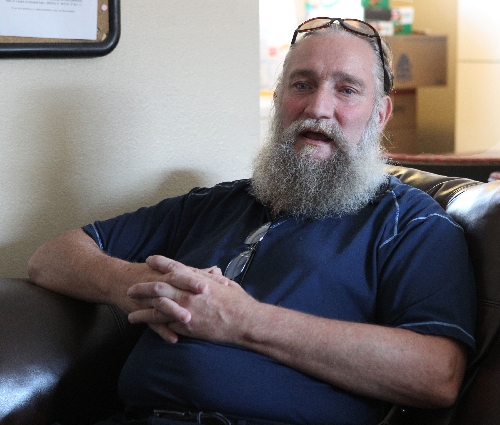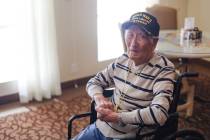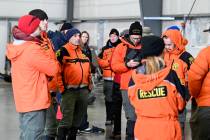Las Vegas-area organizations help homeless vets find shelter

While working as a music promoter, Army veteran William Richardson earned the nickname "Casper" for his uncanny ability to bring things together behind the scenes.
But when his life fell apart a few years ago, Richardson couldn’t piece it back together by himself.
His mother had died unexpectedly in a local hospital, sending Richardson into a downward spiral.
"My health started deteriorating," said the bearded Tennessee native, 57. "I got off track."
Richardson couldn’t work, lost his apartment and eventually wound up homeless. He spent months living in a shelter near downtown.
There, an outreach worker from U.S. Vets–Las Vegas approached him. The outreach worker had just the place for Richardson.
U.S. Vets, an 11-year-old nonprofit that runs transitional and permanent housing programs for veterans, is one of several local organizations that help homeless vets and those at risk of becoming homeless.
The agency has a 240-bed transitional housing program on Bonanza Road near Las Vegas Boulevard and has for each of the past nine years hosted a Veterans Stand Down where hundreds of local vets find help with housing, employment and other needs.
Last summer U.S. Vets opened the Radcliff, a complex of 26 furnished apartments on Sahara Avenue near Paradise Road for chronically homeless veterans who are disabled.
Richardson, who suffers from degenerative bone disease, among other health issues, settled in at the Radcliff. Nine months later, he is "finally hopeful" about the future.
"The program is good," he said. "It works."
U.S. Vets was able to open the Radcliff because the current federal administration has increased funding to helping homeless vets. Veterans Affairs Secretary Eric Shinseki launched a program last year to give 40 states, including Nevada, a combined $41.9 million to provide 2,568 beds for homeless vets. The VA’s budget increased from $99.8 billion to $115 billion in 2010 and grew to $126.6 billion last year.
Shinseki’s goal is to eliminate homelessness among veterans by 2015.
It’s a tall order, but many of those who work with homeless veterans say the stepped-up funding has already improved the situation locally.
They point to an early 2011 homeless census that found there are 1,350 homeless veterans on any given night in Clark County. That is down from 2,262 in 2009, a 40 percent decrease.
"We believe that the increased availability of affordable housing, temporary financial assistance being offered and more permanent housing beds for those who have been chronically homeless and for veterans with disabilities has attributed to the decrease," said Shalimar Cabrera, site director for U.S. Vets.
The focus on eliminating homelessness among veterans also "has inspired more collaboration and more solutions," she said.
Staffers from the organization also joined other regional officials this month to conduct a two-day survey of local homeless people as part of a national effort to house 100,000 of the most vulnerable through donations and other resources.
But not everybody believes all the good news.
Dennis Larson, president of the Key Foundation – a nonprofit organization that helps veterans – believes thousands of homeless veterans went uncounted in Clark County.
The number "is much higher" than reported "and it’s getting worse," he said.
The problem "doesn’t go away," he said. "We’ve got new guys coming in out of Iraq, Iran and Afghanistan. It’s a whole new crop."
The Key Foundation, started in 1991, has its own transitional housing program, which takes veterans off the streets and places them in one of three houses or three trailers maintained by the agency. It also helps veterans find employment, get identification and military discharge documents.
Whatever the number of homeless veterans, there are not enough local resources to house them all, said Emily Wischhusen, a case manager for U.S. Vets stationed at the Radcliff.
"There are more chronically homeless veterans than beds in the city," she said.
It is also important to remember that, while increased housing is important, supportive services such as case management and employment assistance are crucial to helping homeless veterans become self-sufficient, Cabrera said.
Helping keep veterans from becoming homeless in the first place is another area that needs more focus, she said.
"More and more younger veterans from the current conflict overseas are coming home and finding the transition to civilian life to be very difficult," Cabrera said. "Many have already found themselves homeless and some have found that their entire family unit is at risk of homelessness."
U.S. Vets recently started a family program that offers temporary financial assistance for rent, utilities and other expenses to veterans and their families to prevent homelessness.
Those who live at the Radcliff receive counseling, case management, life skills classes and other services. Veterans who earn an income contribute 30 percent to the cost of their housing each month.
Richardson, who served in the Army from 1978-1980, is able to do that now that he is receiving $698 a month in disability benefits.
It is not uncommon for veterans to experience homelessness after becoming disabled and while waiting for disability benefits, Wischhusen said.
Richardson is thriving at the Radcliff, where he serves as a community services coordinator, or liaison between residents and staffers. Eventually, he hopes to get his music promotion business back up and running.


















